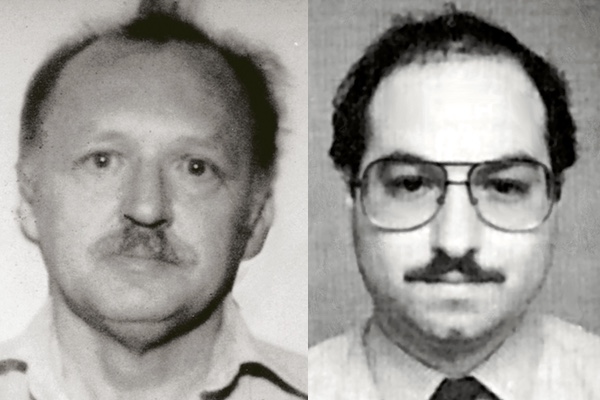Secret Spies: The Class of 1985

Ronald Pelton and Jonathan Pollard
Jonathan Pollard’s recent release from prison has attracted a lot of attention, but another more important spy – Ronald Pelton— was just paroled. They are both the last of the 1985 “Year of the Spy” inmates to be let out into society thirty years after they were caught.
In fact, Pelton, a former National Security Agency (NSA) analyst was one of the NSA’s most damaging spies before the Edward Snowden revelations. Pollard’s story shouldn’t be viewed in isolation. The Pollard and Pelton cases mark the end of a Cold War spy era, a tidier era of ideological polarities when the enemy was in focus not diffuse and spread out.
1985 was a remarkable year for defections and spy catching. Major intelligence officers like KGB London Station Chief Oleg Gordievsky defected from the East to the West, a top West German Counter-Intelligence officer Hans-Joachim Tiedge defected from the West to the East, and another KGB officer Vitaly Yurchenko defected from the Soviet Union to the United States only to return to the Soviet Union a few months later.
Amidst this two-way trafficking of defections, eight American traitors were themselves betrayed by the betrayers and then caught and convicted. The most notorious and well-know case was retired naval officer John Anthony Walker Jr. along with his family spy ring. They spied for the KGB for eighteen years spilling the beans of the US’s most closely guarded naval communication secrets allowing the KGB to read all encrypted messages. If Walker had not died of cancer last year, he too would have been eligible for parole this year along with Pollard and Pelton.
Although the majority of caught agents spied for the KGB, others like Pollard, spied for Israel, CIA agent Sharon Marie Scranage for Ghana and was part of a honey trap and Larry Wu-Tai Chin, a CIA translator spied for China. Chin suffocated himself with a plastic bag in prison after his sentence. All of the other 1985 spies have been released.
As part of the whirlwind of defections and betrayals, former NSA analyst Ronald Pelton had been fingered by the repentant defector Yurchenko. Like Walker, Pelton’s motivation for passing on secrets to the KGB, was greed. Underwater because of under-estimated building costs for a new house, he went bankrupt and quit his job at the NSA where he had worked as a loyal secrecy worker from 1964-79, refusing to talk about his work even to family members.
Reluctance to talk about his secret work changed abruptly when Pelton walked into the Russian Embassy in Washington, DC in January of 1980 to sell the knowledge he had in his head. Even though he came empty-handed without classified documents his remarkable memory turned out dozens of eavesdropping secrets to the Russians. Most sensational was the underwater cable tapping operation called “Ivy Bells.” The Russians learned that US submarines tapped Soviet underwater military communications.
It would be easy to conclude that Ronald Reagan’s crackdown on spies and a hefty investment in counter-intelligence led to these arrests. But this doesn’t explain the increasing traffic in defections and that the defectors or family members not meticulous gumshoe work fingered the agents.
What is clear is that there were a lot more spies around by the last decade of the Cold War. If there are more spies, more spies are planted in the opposition and more spies are caught. Many of the spies also became increasingly disillusioned by their respective systems.
Many more people also had access to secrets. They used this access to finance extravagant lifestyles by peddling secrets to the other side. When Cold War spy James W. Hall was asked why he didn’t become a drug dealer to earn extra money, he replied that had never met a drug dealer and that he was dealing in secrets. Many of the spies from the eighties spied for the money (unlike Julius Rosenberg, who spied for ideological reasons).
The enormous spy bureaucracies built during the Cold War climaxed in the 1980s, shrank only slightly in the 1990s, and grew again after 9/11. Most troubling is that they show no sign of disappearing. Yet it is this system and the amount of people who have access to secrets and American greed that lead to large-scale betrayals.
